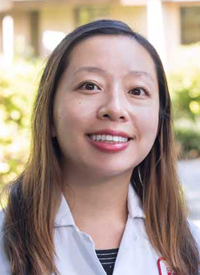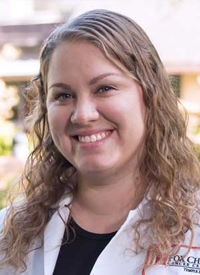Fox Chase Providers Receive 2021 JADPRO Article of the Year Award for Review on Managing Adverse Events in Immunotherapy
A team of advanced practice providers in the Department of Hematology/Oncology at Fox Chase Cancer Center have received the 2021 Article of the Year Award from the Journal of the Advanced Practitioner in Oncology (JADPRO). This award is given to one article each year that demonstrates an exceptional contribution to the body of literature for oncology advanced practice.
Victoria Wong, MHS, PA-C

Physician assistants Carolyn Zawislak, PA-C and Victoria Wong, MHS, PA-C, and retired nurse practitioner Barbara Rogers, CRNP, MN, AOCN, ANP-BC, received the award for their review article, “Management of Hematologic Adverse Events Associated With Immune Checkpoint Inhibitors.”
Carolyn Zawislak, PA-C

“It’s a huge honor to have received the award and recognition,” said Wong. “We’re excited for more people to be exposed to the article and gain awareness of rarer side effects of immunotherapy.”
The impetus for the paper came from Wong’s encounter with a patient who experienced a rare hematologic—blood-based—adverse event during immunotherapy treatment. Wong is part of an immunotherapy working group with Zawislak and Rogers, and when they discussed the case and then searched for relevant literature, they found a significant knowledge gap.
“There are case reports and reviews on just one subtype of hematologic adverse event, but we couldn’t find too many articles that were synthesizing all of the information,” said Zawislak.
“So our goal was to give an overview and some brief instruction on how to handle hematologic adverse events,” she added. “We thought this would be something that we would like to use, so we wrote it.”
Hematologic adverse events, namely anemia, thrombocytopenia, leukopenia, and neutropenia, are among many possible side effects of immunotherapy. They occur because when the immune system is activated—as it is by immunotherapy, which uses a person’s own immune system to recognize and fight cancer—it can potentially attack any tissue, including healthy tissue.
Common adverse events that arise from immunotherapy include rash, colitis, and thyroid dysfunction. Hematological adverse events are rare; they occur in only 1% to 5% of cases. As a result, these types of adverse events are not as well known or commonly understood.
In light of this, the three wanted to help practitioners better recognize, understand, and manage hematological adverse events. “It serves to help recognize what those red flags are and to know when to intervene or stop therapy, start steroids, and so forth,” said Zawislak.
Zawislak and Wong will receive their award at JADPRO Live, the annual meeting of the Advanced Practitioner Society for Hematology and Oncology (APSHO), which will take place October 20–23, 2022, in Aurora, Colorado.
APSHO is a society for advanced practitioners: nurse practitioners, physician assistants, pharmacists, clinical nurse specialists, and other oncology healthcare professionals. The mission of APSHO is to promote oncology patient care that is high quality, cost effective, and delivered through collaborative practice models by optimizing the role of the advanced practitioner as an integral member of the care team.
***
About Fox Chase Cancer Center
Fox Chase Cancer Center (Fox Chase), which includes the Institute for Cancer Research and the American Oncologic Hospital and is a part of Temple Health, is one of the leading comprehensive cancer centers in the United States. Founded in 1904 in Philadelphia as one of the nation’s first cancer hospitals, Fox Chase was also among the first institutions to be designated a National Cancer Institute Comprehensive Cancer Center in 1974. Fox Chase is also one of just 10 members of the Alliance of Dedicated Cancer Centers. Fox Chase researchers have won the highest awards in their fields, including two Nobel Prizes. Fox Chase physicians are also routinely recognized in national rankings, and the Center’s nursing program has received the Magnet recognition for excellence five consecutive times. Today, Fox Chase conducts a broad array of nationally competitive basic, translational, and clinical research, with special programs in cancer prevention, detection, survivorship, and community outreach. It is the policy of Fox Chase Cancer Center that there shall be no exclusion from, or participation in, and no one denied the benefits of, the delivery of quality medical care on the basis of race, ethnicity, religion, sexual orientation, gender, gender identity/expression, disability, age, ancestry, color, national origin, physical ability, level of education, or source of payment.


